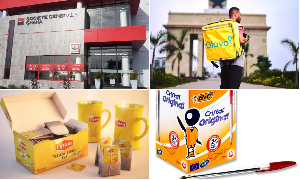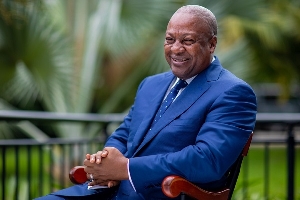- Home - News
- TWI News | TV
- Polls
- Year In Review
- News Archive
- Crime & Punishment
- Politics
- Regional
- Editorial
- Health
- Ghanaians Abroad
- Tabloid
- Africa
- Religion
- Election 2020
- Coronavirus
- News Videos | TV
- Photo Archives
- News Headlines
- Press Release
General News of Saturday, 4 May 2024
Source: www.ghanaweb.com
Societe Generale, Glovo, and other multinational companies that have left Ghana
Ghana's economic landscape has posed challenges for multinational companies, resulting in a significant exodus of brands from the country.
Despite the country's potential as a destination for foreign direct investment, Ghana has faced economic hurdles impacting both local and international businesses.
Since 2022, unstable economic conditions in Ghana have prompted many international corporations to relocate their operations.
The fluctuating value of the Ghanaian cedi, high inflation rates, and the high cost of imports are major factors contributing to this trend. Additionally, energy challenges, including frequent power outages known as "Dumsor" and rising utility costs, have further complicated the business environment.
As a result, several well-known multinational companies have ceased operations in Ghana, citing strategic realignment and unfavourable operating conditions. These departures have not only affected job creation and Ghana's Gross Domestic Product (GDP) but also broader economic growth and tax revenue.
GhanaWeb Business looks into some of these multinational companies that have left or are planning to leave Ghana.
1. Glovo:
The delivery service provider announced its exit from the Ghanaian market, effective May 10, 2024, due to profitability challenges and a difficult business climate.
The company stated, "Whilst we recognise the potential of the Ghana market, building a stronger position and achieving profitability would require substantial investment over an extended period. This is why we have decided to redirect our resources towards the other 23 countries where Glovo operates to better serve the millions of customers who use the Glovo app every day."
2. Nivea:
The skincare brand discontinued its operations in Ghana in December 2023, citing high operating costs and taxation as reasons for its departure. The company's action was a result of the need to streamline operations and focus on markets where sustainable growth and profitability can be achieved.
3. Jumia Foods:
Popular e-commerce platform Jumia shut down its food delivery division in December 2023 due to unsustainable market conditions and economic factors. This closure also reflects Jumia's financial difficulties, including a significant 41% loss amounting to $49.8 million in the last quarter of 2022.
4. Lipton Tea (Unilever):
In March 2024, Unilever Ghana relocated its tea production operations from Ghana to Nigeria, citing ongoing economic challenges in Ghana.
5. Dark and Lovely:
The haircare brand exited the Ghanaian market, citing the challenging economic environment and rapid changes in the beauty industry as reasons for its departure.
6. BET 365:
The online betting company withdrew its operations from the Ghanaian market, citing an unsustainable tax burden and regulatory hurdles as reasons for its departure.
7. Game:
The popular South African retailer closed its branches in the Accra and West Hills malls in 2022 due to financial challenges. This closure was part of a strategic decision by its parent company, Massmart, to shut down eight underperforming stores across Africa.
8. BIC:
The popular pen production company moved its operations from Ghana to Ivory Coast in March 2024, citing economic challenges as the reason for the relocation.
9. Societe Generale:
The French bank has announced its plans to exit the Ghanaian market after two decades of presence.
This decision is part of a broader withdrawal from several African countries, including Cameroon and Tunisia. Societe Generale's move follows recent divestments from other African markets and a strategy to focus on markets where it can be a leading bank.
The departure of European banks like Societe Generale from Africa is linked to factors such as stiff competition, high operational costs, lower investment returns, and stringent regulatory demands.
ID/MA
Ghana’s leading digital news platform, GhanaWeb, in conjunction with the Korle-Bu Teaching Hospital, is embarking on an aggressive campaign which is geared towards ensuring that parliament passes comprehensive legislation to guide organ harvesting, organ donation, and organ transplantation in the country.











